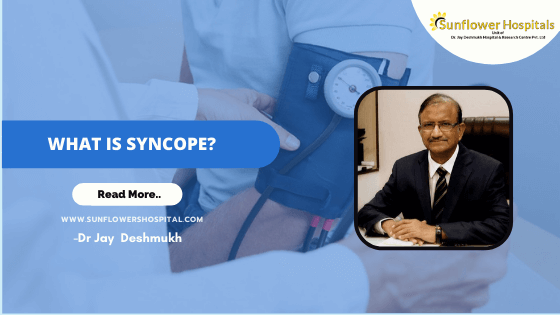A temporary decreased blood supply to the brain Is syn-cope. This leads to fainting or loss of consciousness for a few minutes or so. The person regains consciousness after a few minutes and is back to normal. There are many medical conditions that can lead to syncope. The most frequent cause is vasovagal syncope, which is not a serious ailment. However, there are few cases, that could be an indication of a serious underlying cause.
How common is syncope?
This is a common condition that affects about 4% of the population. Almost 6% of older people may have syncope at some point in their lives. The incidence of syncope increases as you get older. This occurs in people with or without underlying medical conditions.
What is the commonest type of syncope?
Cardio-neurogenic or vasovagal syncope is the commonest type of syn-cope. This is a result of a sudden drop in blood pressure when you are standing up. This causes decreased blood flow to the brain. Our autonomic nervous system does not allow our blood pressure to fall on standing. The blood vessels down below our diaphragm constrict to prevent a fall in BR In conditions when this protective mechanism gets jeopardised, the BP falls in standing and the person drops down and loses his consciousness.
What is a situational syncope?
This occurs in certain situations that affect the nervous system and leads to syncope. These are dehydration, intense emotional stress, anxiety, fear, pain, hunger, use of alcohol or drugs. Fast breathing, coughing forcefully or urinating in standing may at times cause syncope. What are the symptoms of syncope? Blacking out, feeling light-headed, feeling dizzy, falling for no reason, feeling dizzy, fainting after eating or exercising. Some may feel unsteady or weak on standing. Some may have changes in vision or headaches. Many times, premonitory symptoms may warn you of an impending syncope. Please lay down or sit down. At times syncope may be preceded by palpitations or sensation of fluttering of the heart. Sudden fast beating of the heart or sudden slowing of heart rate can lead to syn-cope.
How is syncope diagnosed?
co Please give detailed information about your symptoms to your doctor This may minimise your investigations. A few tests may help your doctor to diagnose the cause and prevent a recurrence. If you are on BP-lowering medications or are being treated for prostate symptoms, please tell your doctor. It is advisable to check your BP in a standing position if you are tinder treatment for 13P or any cardiovascular disease.
What is a Tilt test?
Your heart rate, blood pressure are measured in lying down, sitting and lying down position. Drop-in BP in standing and also if the heart rate starts reducing on standing, the test is considered positive. Simple changes in your lifestyle may reduce recurrence.
What are the tests required to determine the causes of syncope?
This includes blood tests for anemia and metabolic changes. Electrocardiography or ECG is absolutely necessary to look for heart rate or rhythm disturbances. An exercise stress ECG may be required in select• ed cases. 2 D echocardiogram is necessary to check the valves, size of chambers and swelling within the heart. Sometimes a brief spell of unconscious state may be a manifestation of epilepsy. This may require an EEG, which records the electrical activity of the brain. A Tilt test is done to diagnose vasovagal symptoms. The tests depend on the nature of symptoms and clinical examination.
What are the treatment options?
This depends on your assessment by your doctor and the test results. This may include changes in your fluid and salt intake. It may include changes in your BP medications. You may be asked to wear tight stockings on your legs to prevent peripheral pooling of blood. Some may require medications to stabilise their heart rate or rhythm. You may be asked to see a counsellor or take treatment for anxiety or panic attacks. Some may require a permanent pacemaker to increase your heart rate to normal or some may require an implantable cardiac defibrillator ( ICD). This device monitors your heart rate and corrects a sudden burst of fast heart rate that can lead to syncope. Syncope presents a unique opportunity to the caregiver. He needs to correctly diagnose the cause for the syncope and provide remedial measures. Neuro cardiogenic syncope or vaso-vagal syncope is the commonest and not difficult to manage. However commonly in the elderly a serious heart ailment could be the cause and may require urgent attention.
Author: Dr Jay Deshmukh
Dr Jay Deshmukh is Chief Physician and Director, Sunflower Hospital, Nagpur Honorary Physician to Honorable Governor of Maharashtra and PondicherryCentral. Dr Jay Deshmukh is an M.B.B.S., M.C.P.S., F.C.P.S., M.N.A.M.S., MD From Internal Medicine – Bombay and New Delhi.


